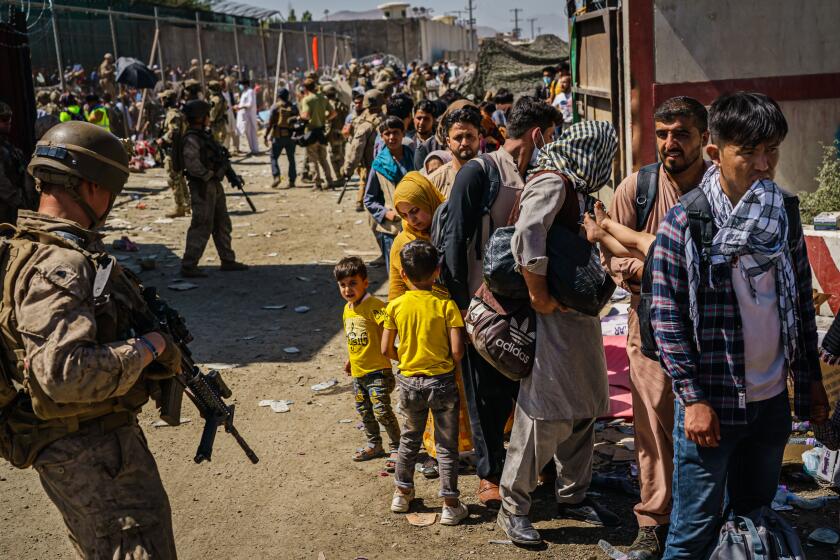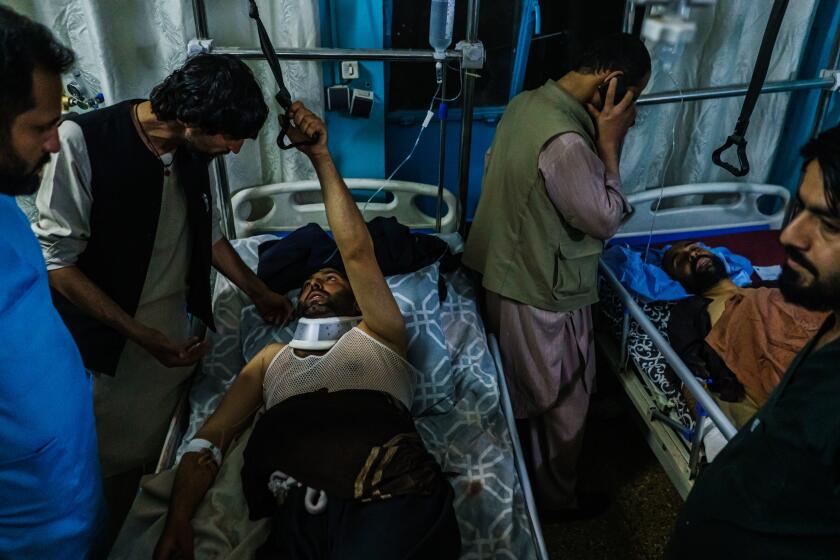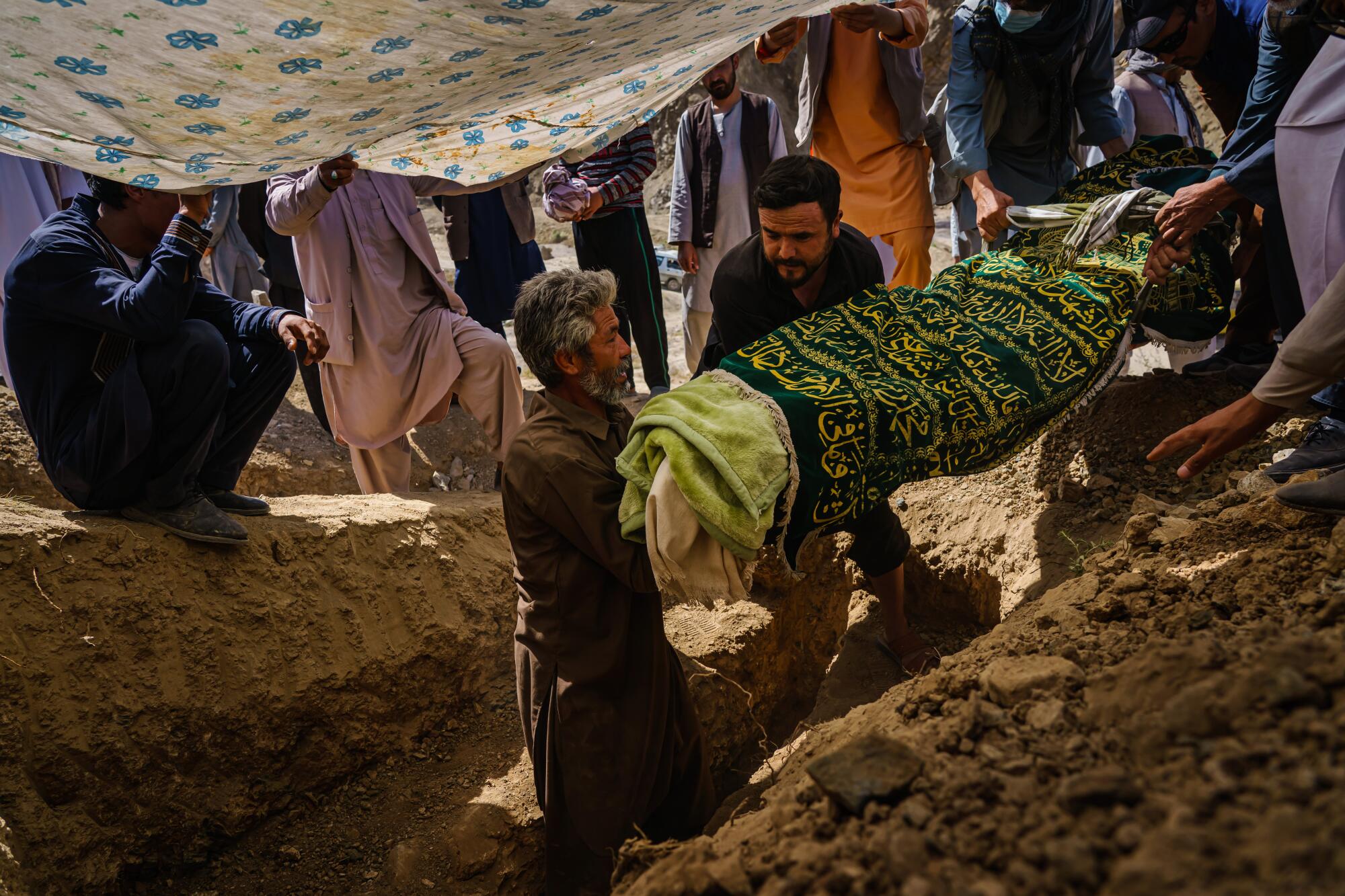
- Share via
KABUL, Afghanistan — The family trudged up the hill to the tap-tap of a pickax digging out the grave where Mushtaq would be buried.
It had been just a day since a bomb ripped through the massive crowd gathered outside the Kabul airport in hopes of being evacuated. Mushtaq was among the dead.
For the record:
11:49 p.m. Aug. 27, 2021An earlier version of this report misspelled the name of Mushtaq’s son, Ruhallah.
“No more Afghanistan,” said his 28-year-old brother, Jamil, as the harsh midday sun beat down. “We can’t live here.”
He gazed across the dust-swept slopes of Martyrs Hill, where other, equally somber processions picked their way among the headstones to where more loved ones were to be laid to rest.
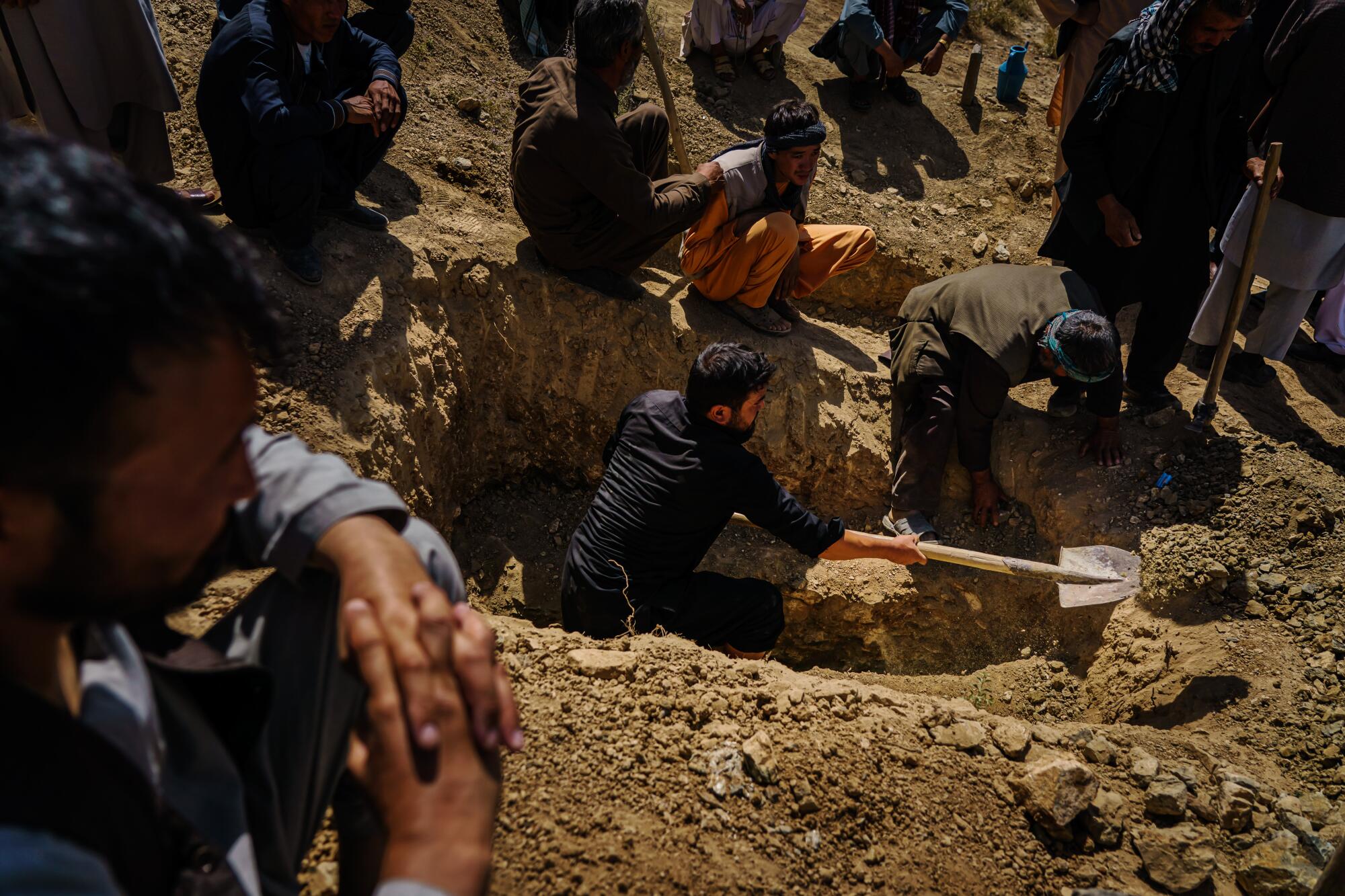
More than 24 hours after the bombing, which was claimed by Islamic State’s affiliate in Afghanistan, the full measure of the slaughter was still unclear. As more of the injured succumbed to their wounds Friday, the death toll jumped from 90 Afghans to at least 169, in addition to 13 U.S. service personnel.
The magnitude of the carnage — the extremists had chosen the site for maximum damage — seemed a preview of Afghanistan’s violent future under the Taliban, despite the group’s insistence that it would bring stability and order to a country that hasn’t seen much of either in decades.
Afghanistan’s best and brightest are leaving the country in droves, taking with them skills and knowledge that the Taliban wants put to its service.
But most of all, it increased people’s determination to flee.
“All people like me, we want to leave from any border we can,” explained Jamil, who like all ordinary Afghans interviewed for this story said he feared the Taliban and spoke on condition that his full name not be used.
The pickax continued its tap-tap.
Behind the gravedigger was a stretcher with the body wrapped in a green blanket with religious verses in elaborate gold-colored script. Two boys held up a floral-patterned bedsheet to shield Mushtaq from the heat.
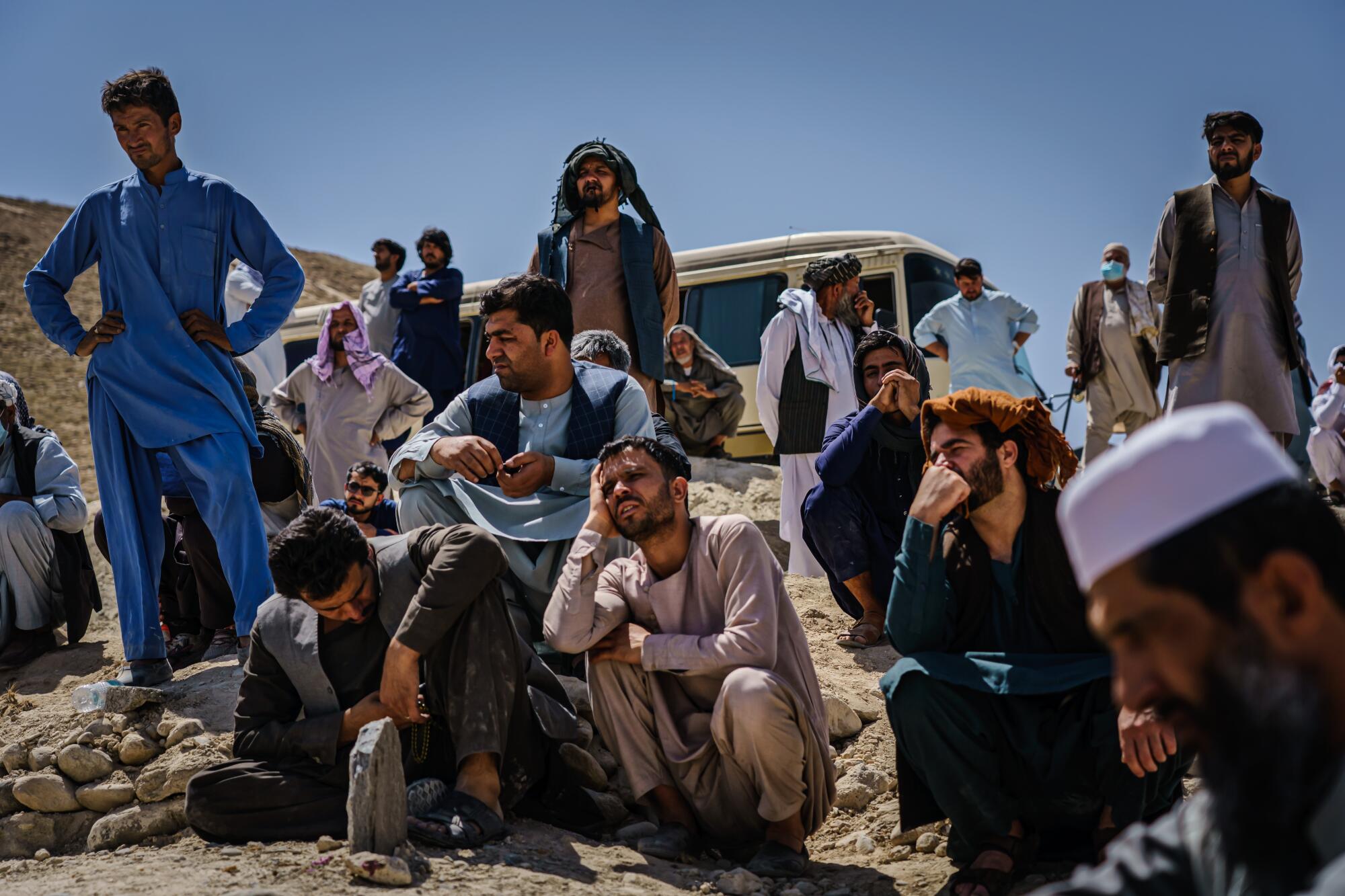
Around them, the few dozen mourners, mostly relatives, hunted for shade under the squat mausoleums sprinkled on the hillside.
Not far away, a preacher was nearing the end of his sermon and the conclusion of the funeral for Abdul Raouf.
A bombing killed 13 U.S. service personnel and more than 169 Afghans on Thursday outside the airport in Kabul.
He had received a U.S. visa just this week and was set to leave Afghanistan with his wife and daughters, ages 2 and 4.
In recent days, messages from the U.S. Embassy warned people against heading to the airport, telling those cleared for evacuation they should wait for instructions to go to an alternate location.
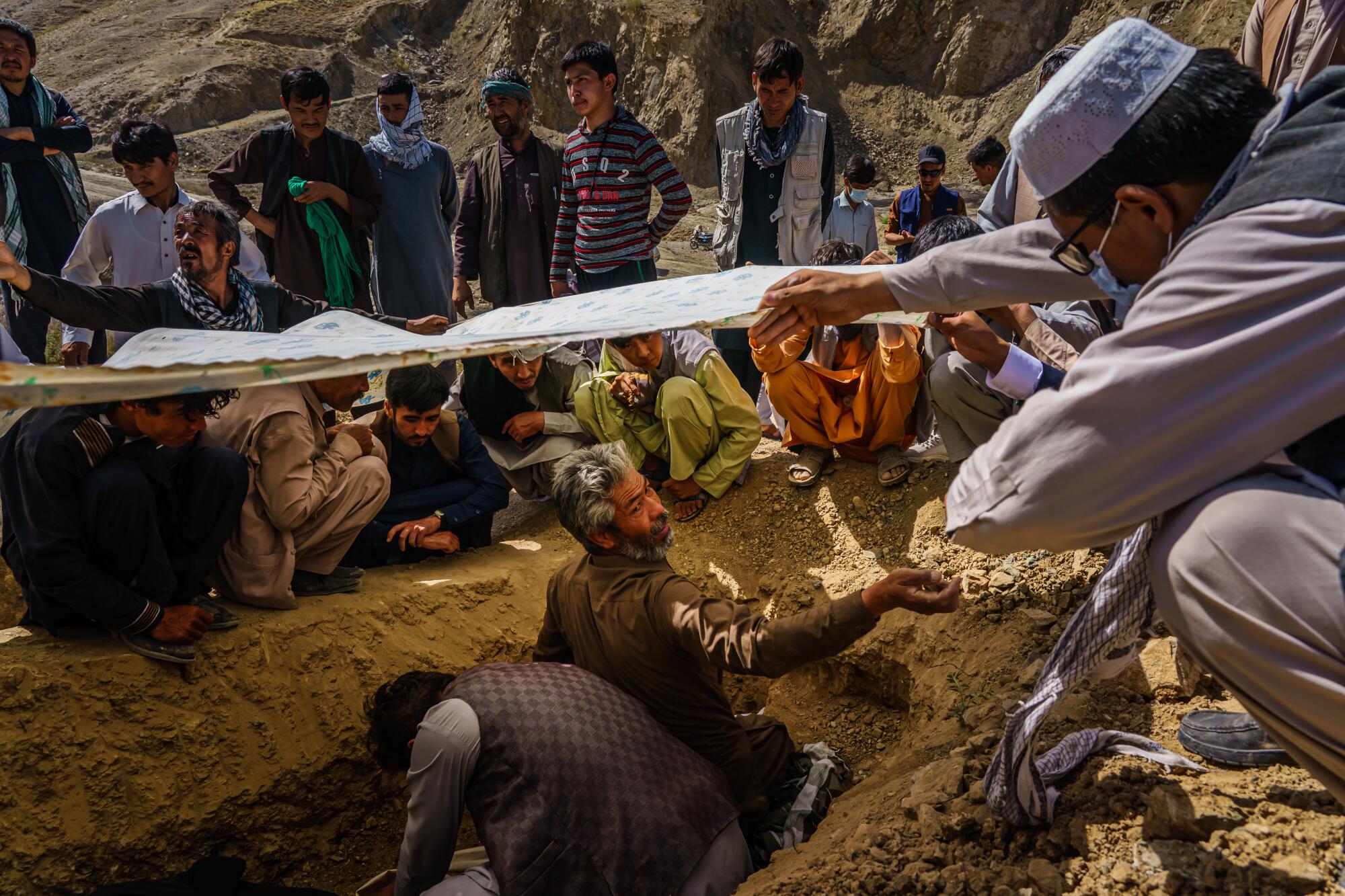
Fearing his escape window was closing, Abdul Raouf went to the airport anyway. His wife and his brother, Abdul Satar, waited with the children outside the barriers as he proceeded to Abbey Gate to talk with the American troops keeping watch over the queues.
“He wouldn’t wait. He was trying his best,” Abdul Satar said. “He told me, ‘When I get in, you should collect the family.’”
His family found him in the next morning, when his corpse was delivered to Wazir Akbar Khan Hospital.
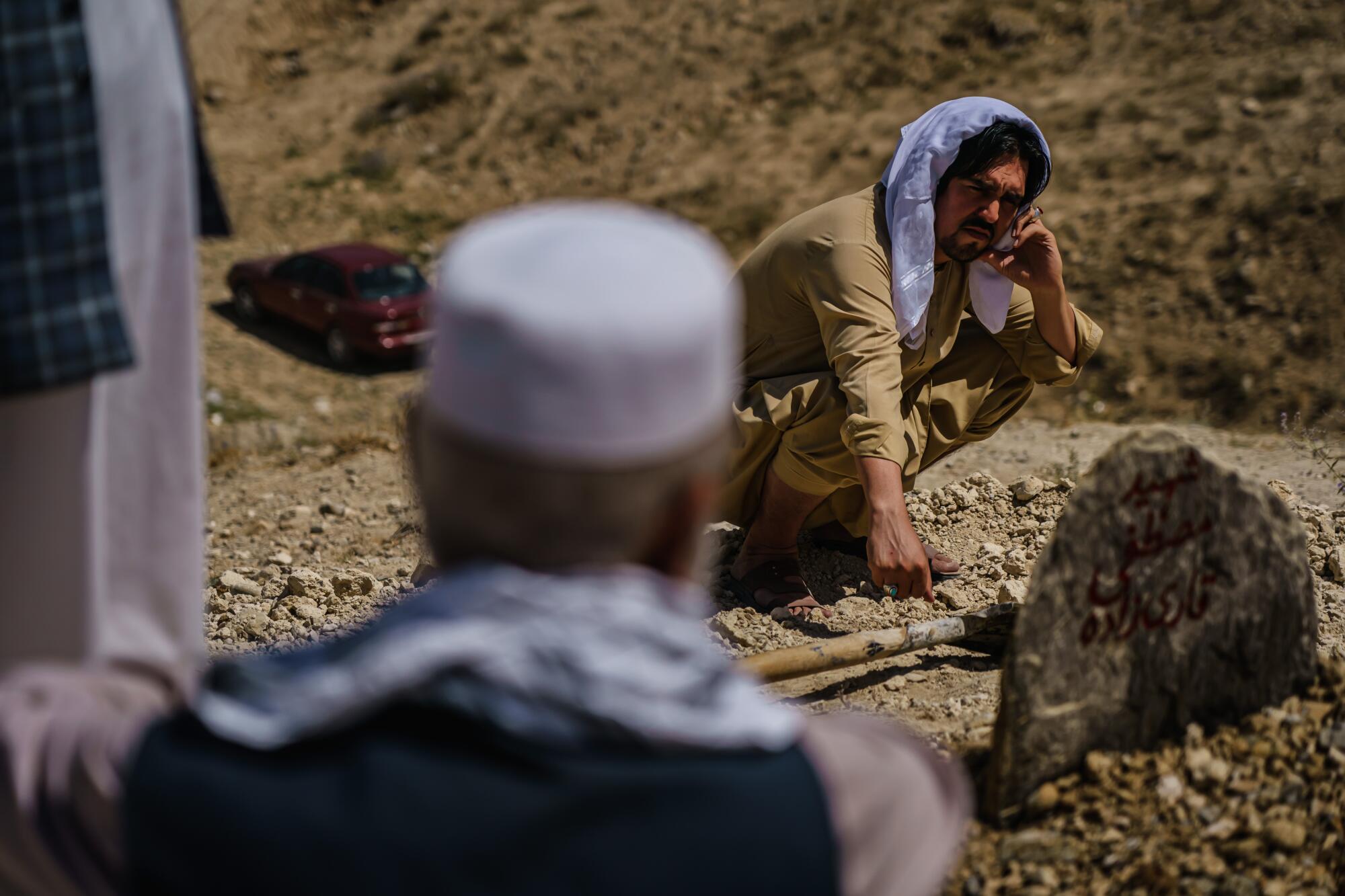
“So many bodies were there,” Abdul Satar said. “I saw bullet holes in his arms.”
As the funeral ended, Abdul Satar appeared dazed, struggling to walk and slurring his words as he tried to speak about his brother. “I am confused, just confused about everything,” he said over and over.
The digging of Mushtaq’s grave continued. Now others were giving the gravedigger a rest and taking turns with a shovel.
Mushtaq, 40, had been a police officer in the U.S.-backed Afghan security forces. When the Taliban steamrolled into Kabul on Aug. 15, he went into hiding.
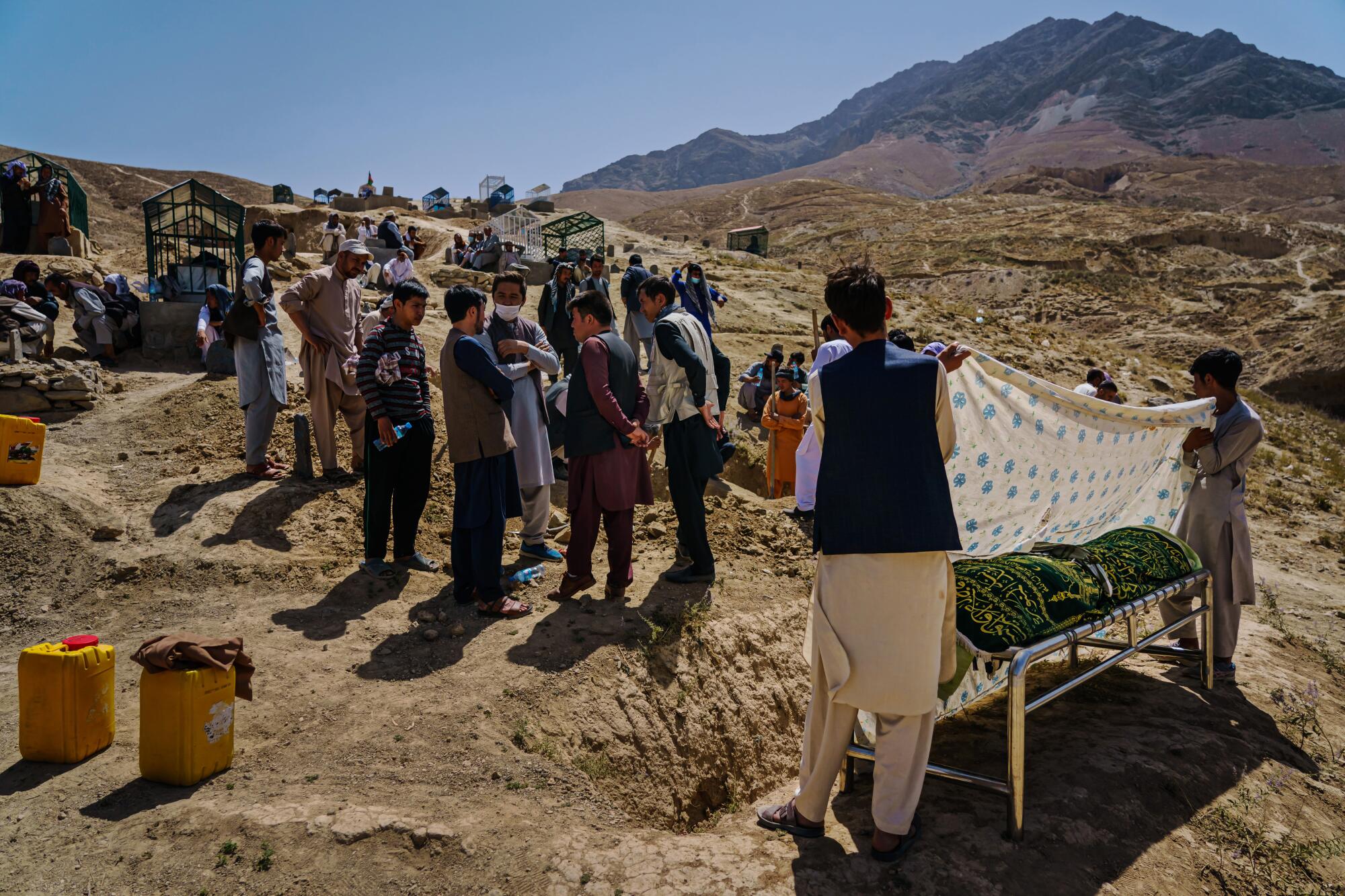
Although the Taliban has promised not to seek retribution, Mushtaq changed houses every night, switching from relative to relative. A week ago, the Taliban came to his home and asked a neighbor where Mushtaq was and where he kept his gun.
That’s when he decided to try his luck at Kabul’s airport. Though Mushtaq had no special immigrant visa — which the U.S. grants to its Afghan allies — he took his wife, four sons and a daughter with him.
On Thursday, they finally made it to Abbey Gate, where troops from the U.S. and other Western nations were processing would-be refugees.
Mushtaq left his family standing in a knee-deep sewage canal beside the airport’s concrete barrier, where hundreds of others were also waiting in disorderly queues. He approached the Americans and waved his documents and passport in the hope they would grant him permission to leave.
That’s when the suicide bomber detonated his vest. The blast ripped through the crowds. Mushtaq’s son, 16-year-old Ruhallah, doesn’t remember what happened next, but he couldn’t find his father.
“I tried to go up and look for him, but the Americans shouted, ‘Get down!’ every time we tried to stand up,” he said.
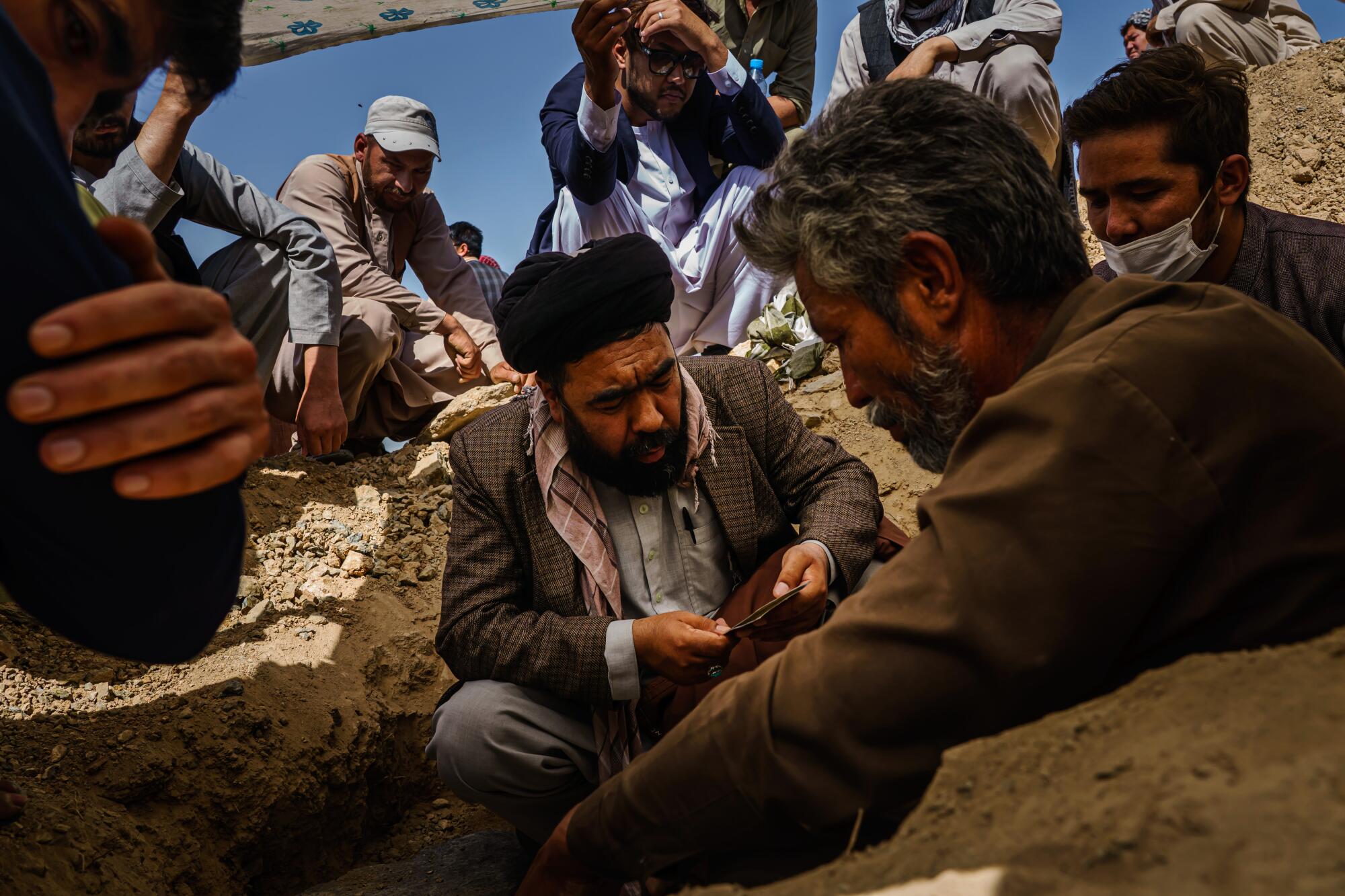
The next morning, he received a call from his uncle, who told him his father was injured and he had to rush home. But Mushtaq was already dead.
Ruhallah stood a bit away from the crowd of mourners, his slight frame bent, a pair of sunglasses covering his eyes, which were puffy from blast trauma and tears.
“In this situation, we have to go,” Ruhallah said.
But it seemed clear it would be impossible to do so, at least not before the Aug. 31 withdrawal deadline that President Biden has vowed to honor.
Though more than 111,000 people have been airlifted out of the country, and despite fresh warnings of another suicide attack, crowds on Friday morning thronged yet again to the airport. Access had become more restricted, with the Taliban setting up roadblocks and clearing out the environs.
Mushtaq’s grave was finally ready. It had taken well over an hour of digging.
Several men carried the stretcher to the graveside, where they unwrapped the blanket to reveal the kafan, the white cloth covering the corpse.
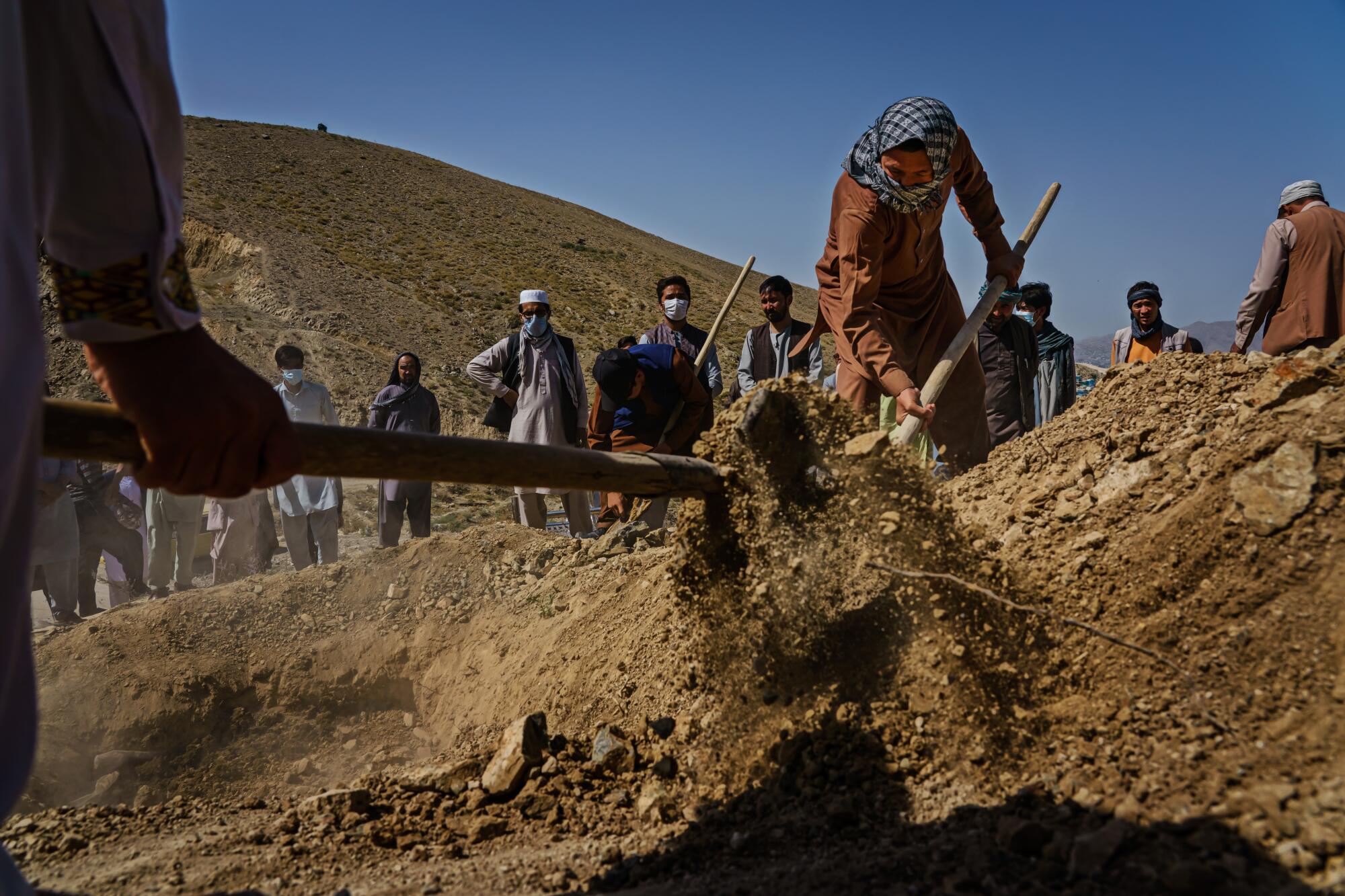
Hoisting the body in his arms, a man carefully lowered Mushtaq into a narrow trench at the bottom of the grave. Then he placed two jagged slabs of gray rock side by side over the trench.
Another relative mixed sand with water to make mud as the preacher chanted a verse from the Quran to the refrain of “Pray on Muhammad and the family of Muhammad.”
Once finished, Jamil and other relatives brought more slabs and smaller rocks to finish covering the trench. Others placed a plastic sheet over the slabs and began to fill the grave with the mud, and then with sand. Another slab served as a headstone.
“No one asks about us,” Jamil said. “All the newspapers and all the magazines spoke about the American troops that were killed. It’s frustrating, because Afghan murder, Afghan dead, Afghan blood — it’s not important.”
The preacher kneeled and put his fingertips on the grave, intoning another prayer. Then he stood up, and the crowd followed him down the hill.
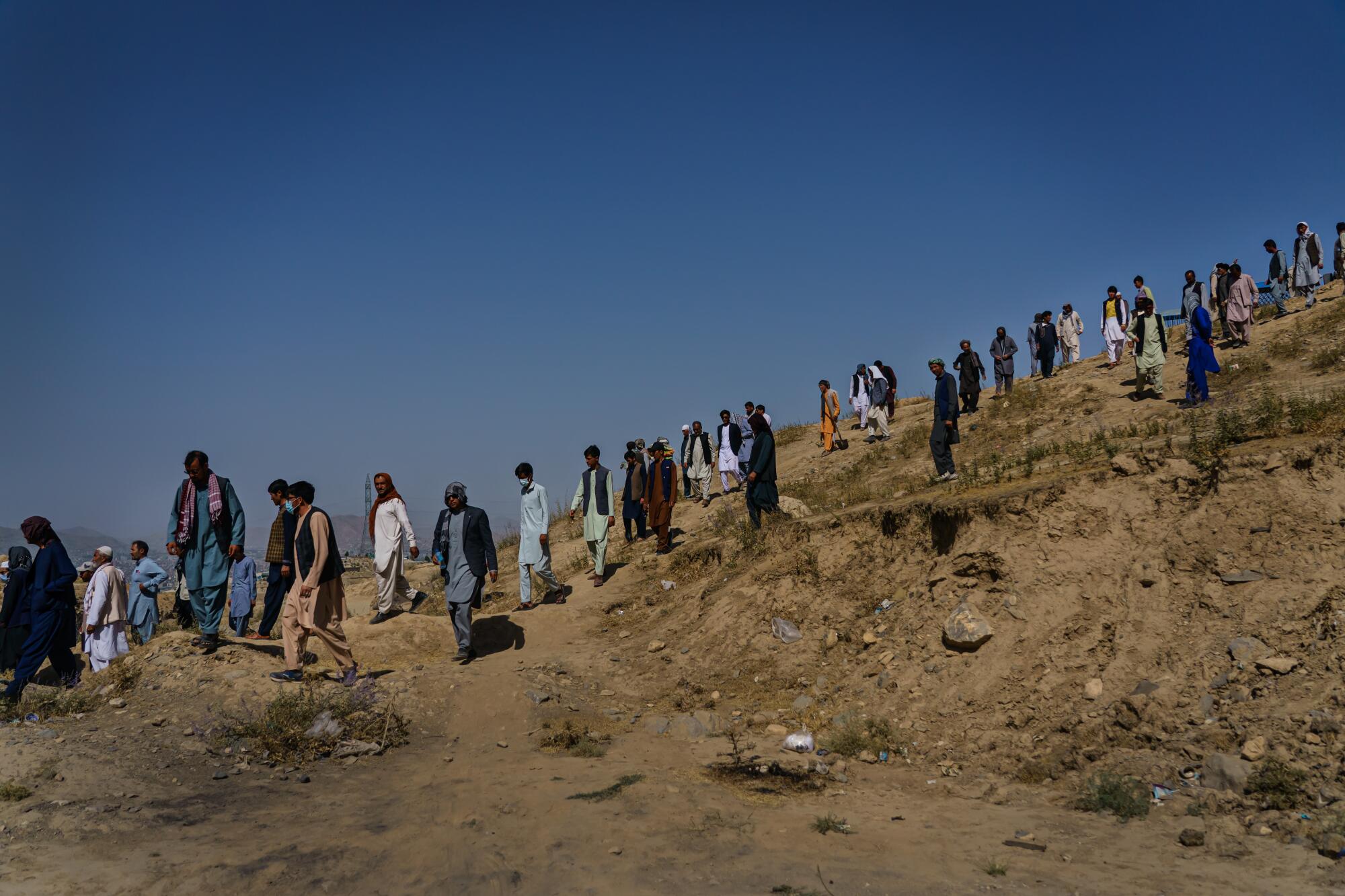
More to Read
Sign up for Essential California
The most important California stories and recommendations in your inbox every morning.
You may occasionally receive promotional content from the Los Angeles Times.
